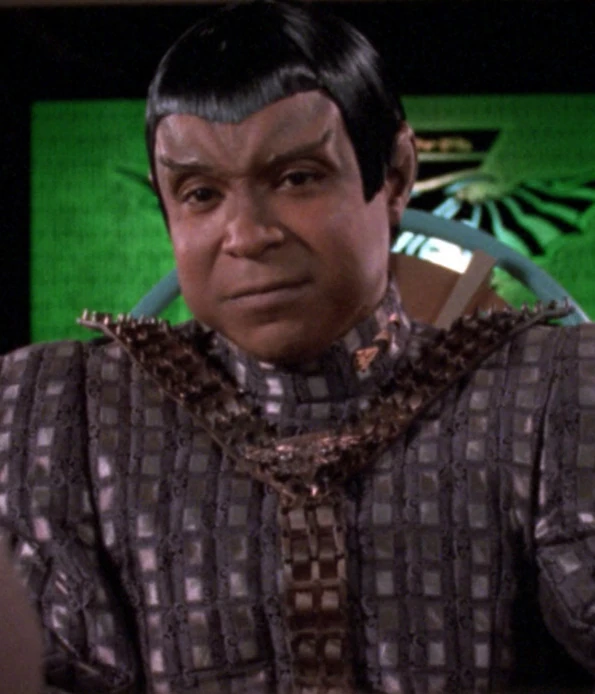Duke Nukem 3D
Duke Nukem 3D is a first-person shooter video game developed and published by 3D Realms.
Released on April 19, 1996, Duke Nukem 3D is the third game in the Duke Nukem series and a sequel to Duke Nukem II. The game was a commercial success and has seen numerous console ports, expansion packs, and special edition re-releases since its debut. It continues to maintain a strong fanbase, which has generated hundreds of mods and thousands of user maps.
As a groundbreaking entry in the first-person shooter genre, Duke Nukem 3D was generally well-received by critics. The game was also immediately controversial and drew criticism in the mainstream media for its violence and pornographic content.
A sequel, Duke Nukem Forever, was released in 2011.
Main Article: Levels in Duke Nukem 3D
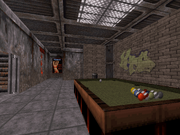
Level design in Duke Nukem 3D is notable for its depth of interactivity, which set a new standard for first-person shooters. Interactive objects include light switches, drinking fountains, strippers, surveillance screens, bins, toilets, pool tables, telephones, explosive barrels, fire hydrants, and a photocopier. Some of these objects perform multiple functions. For example, toilets can be used to urinate or to replenish the player's health by smashing them and then drinking from their water source.
The levels in Duke Nukem 3D also tend to exhibit non-linear design, such that air vents, back doors, and sewers offer converging routes to completion. This non-linearity helps support multiplayer gaming.
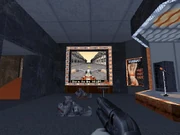
Compared to other first-person shooters of its time, Duke Nukem 3D was also well-received for pioneering realistic location designs with vivid colors and lighting.
There are five episodes in Duke Nukem 3D:
Main Article: Weapons in Duke Nukem 3D
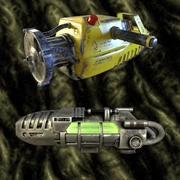
Weapons reimagined in 3D by Edwart Kvasnevsky
Main Article: Items in Duke Nukem 3D
In addition to the weapons, Duke's inventory features a series of items that can be acquired and deployed throughout the game. These items include:
Apart from these standard inventory items, there are also a number of health-boosting items, and hidden Access Cards can be used to unlock doors, deactivate force fields, or trigger explosions.
Main Article: Enemies in Duke Nukem 3D

Duke Nukem 3D features a wide variety of enemies, including extraterrestrial aliens, mutant police officers, and mechanical robots. Five drop ammunition when killed, five explode when killed, five wield explosive weapons, four wield hitscan weapons, five do not wield physical weapons at all, two can jump, seven can fly, and three are recurring, miniature versions of bosses.
In addition, there are five boss enemies, one at the end of each episode. These are:
Main Article: Multiplayer in Duke Nukem 3D
Duke Nukem 3D supports LAN and online multiplayer games. Multiplayer games can take place on any of the levels included with the singleplayer campaign, or they can take place on custom user maps downloaded from the Internet.
The game features several multiplayer game modes:
Duke Nukem 3D supports player-to-player communication through the use of in-game messaging. The player can type a message and send it to a specific player, to their allies, to their enemies, or to everyone. Newer versions of the game also support voice chat.
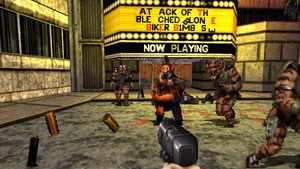
Narrative elements in Duke Nukem 3D are confined to cutscenes at the ends of episodes, as well as an in-game menu and official game lore distributed by 3D Realms. Though sparse, the plot revolves around an alien invasion of Earth sometime in the early 21st century (retconned to 1998 in Duke Nukem Forever). Following the events of Duke Nukem II, Duke Nukem victoriously returns to Earth in his Skycar, which is unexpectedly shot-down on arrival. Aliens have invaded Earth. The aliens have transformed the Neo Los Angeles police department into mutant Pig Cops to do their bidding, and they are abducting all the women.
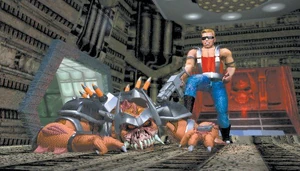
Duke executes the Battlelord
The player assumes the role of Duke Nukem, an imperious action hero, and fights through 48 levels spread across 5 episodes. The player encounters a host of enemies and fights them with a range of weaponry. In the end, Duke annihilates the alien overlords and celebrates by desecrating their corpses.
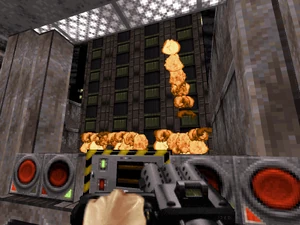
Interactive switches trigger a preprogrammed demolition on Red Light District
Duke Nukem 3D’s graphical engine was a step forward from the Doom engine of 1993, though many of the advanced features of the game had appeared in intervening first-person shooter titles such as Marathon, Star Wars: Dark Forces, and others. While the levels were still defined as 2D maps, the capabilities of Ken Silverman's Build engine allowed more complex levels than Doom. The game supports diagonal slopes in the floors, though this had been seen as early as Ultima Underworld in 1992. It also supports vertical mouse aiming (but lacks perspective correction), though vertical look had also appeared in Ultima Underworld and full mouse look appeared in Marathon.
While Doom was limited to doors opening and closing only by sliding up and down, the Build engine also included doors and walls that could move sideways. The Doom engine usually only moves a single platform at a time in response to a player event, while the Build scripting system allows a whole string of moving and sliding actions, synchronized with sound effects, to create collapsing buildings, earthquakes, and walls that crumble apart when hit with explosives. One of the more advanced effects that went far beyond the limits of the Doom engine is the horizontal sliding platform that can move the player inside a small sliding room, to create subway cars moving in a timed sequence around a ring-shaped track.
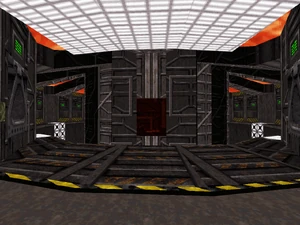
720-degree circle on Lunatic Fringe
The Build engine solves this problem by allowing multiple overlapping 2D paths to cross through the same 2D location. The key is that, while inside one of these spaces, it is not possible to see into the other space, so the "2.5D" engine has no problem rendering one space or the other, even though the map data technically shows the two areas to be occupying the same place. Several Duke Nukem 3D maps exploit this engine feature to create mind-bending maps where multiple large rooms are all seem to be occupying one 3D space. One level in particular (Lunatic Fringe) allows the player to travel 720 degrees around a circle without overlapping the same path.
To resolve the problem of not having balconies or bridges that the player can walk over or under, certain objects are specially coded into the Build engine that are not actually part of the flat 2D map design. Rather, they involve a special class of decorative sprites that can be inserted into the world, similar to the breakable cameras, flowerpots, and lights. These unusual sprites allow the player to walk over or under objects, as if they were actually part of the map. However, these special objects have a highly restricted shape, typically as a perfectly square or rectangular non-sloping structure, greatly restricting their usage to simple bridges, balconies, or exposed rectangular air ducts.
Main Article: Duke Nukem 3D prototypes
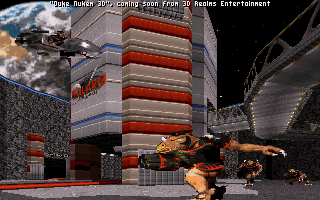
Prototype screenshot from Dark Side
Duke Nukem 3D went through numerous iterations during development. Many of these are known from pre-release screenshots and post-release commemorative videos, while others are directly available to the public. One of these iterations, LameDuke, is a December 1994 prototype that was officially released by 3D Realms to commemorate the one-year anniversary of the game's shareware release. The prototype was released as-is, with no improvements or promises of technical support. It is still freely available to download today.

Main Article: Duke Nukem 3D: Atomic Edition (Plutonium PAK)
Duke Nukem 3D: Atomic Edition was a special edition re-release in 1996. For customers who already owned the game, the Plutonium PAK was sold as a patch that upgraded existing versions of the game to the Atomic Edition. The Atomic Edition introduces a new fourth episode, a new weapon, and three new enemies: the Pig Cop Tank, the Protector Drone, and a new final boss, the Alien Queen.
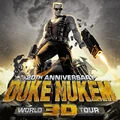
Main Article: Duke Nukem 3D: 20th Anniversary World Tour
Duke Nukem 3D: 20th Anniversary World Tour is a 2016 special edition remake, released to commemorate the game's 20th anniversary. The remake includes all content from Duke Nukem 3D: Atomic Edition, but it adds new levels, enemies, a weapon, and several special features.
Main Article: Expansions for Duke Nukem 3D
Because of the commercial success of Duke Nukem 3D, many third-party developers were interested in producing expansion packs, DLC, and other add-ons for the game. Some of these expansions were authorized by one of the copyright owners and are official products, while many more were unauthorized. The following is a complete list of authorized expansions:
 Duke Assault |  Duke Caribbean: Life's A Beach |  Duke It Out In D.C. |  Duke Nukem 3D Level Design Handbook |  Duke Nukem's Penthouse Paradise |
 Duke Xtreme |  Duke: Nuclear Winter |  Duke!ZONE | 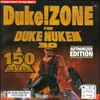 Duke!ZONE 150 |  Duke!ZONE II |
See Also: Category:Compilations
Duke Nukem 3D has been featured in numerous compilations. Some of the most notable compilations include:
See Also: Category:Duke Nukem 3D ports
Duke Nukem 3D has been ported to many consoles in the decades since its initial release:
Main Articles: User maps, Mods and total conversions, List of Duke Nukem websites
Duke Nukem 3D offers free software for creating and editing fan-made user maps. As a result, thousands of user maps have been created and published online or even packaged in compilations in the decades since the game was first released. In addition, the game features highly sophisticated modding capabilities, spawning hundreds of mods and total conversions. User maps, mods, and total conversions continue to be distributed through several popular Duke Nukem websites.
Copies of the classic DOS-based game do not run well on modern devices, but there are still numerous ways to play Duke Nukem 3D.
New copies of the game can be purchased today and played on modern devices from the following sources:
* Purchase includes Duke Nukem 3D: 20th Anniversary World Tour
† Purchase includes Duke Nukem 3D: Atomic Edition, Duke Caribbean: Life's A Beach, Duke It Out In D.C., Duke Nukem's Penthouse Paradise, Duke!ZONE, Duke!ZONE II, Duke: Nuclear Winter, Duke It's Zero Hour, and an extended arrangement of the Grabbag theme by Lee Jackson, procured in FLAC format by Evan "Hendricks266" Ramos
The Atomic Edition version of the game was previously available on GOG.com, and remains for those who purchased it prior to it being pulled.
See Also: Source ports of Duke Nukem 3D
For players who already own copies of the game, it is not necessary to purchase a new copy. Because the game's source code has been officially published by the original developers, numerous fan-made projects have been able to adapt the code for modern devices with high fidelity. These projects require that players provide their own game files, or else the game cannot start.
All of these options are free to download and are still actively maintained by volunteers:

EDuke32 is the most popular option, is truest-to-source, is fully open source, can run any version or expansion of the game, and is required to play most mods

Raze can run any version of the game and is differentiated by its extensively tunable in-game settings and advanced graphical capabilities

BuildGDX provides a front-end for launching not only Duke Nukem 3D but an extensive list of other games in the Build engine

Rednukem was forked from EDuke32 and includes the only existing PC source port of Duke Nukem 64 (requires a ROM file)
Multiplayer is not natively supported by any of the source ports above, but specially dedicated source ports and multiplayer networking layers exist for this purpose. (See Multiplayer in Duke Nukem 3D#Third-party launchers for the most up-to-date list, which changes every few years.)
Emulation of Duke Nukem 3D is generally considered obsolete because the game's source code is publicly available, which has spawned high-fidelity source ports that can be downloaded for free (see above). However, DOSBox offers an emulation-based alternative for those who may want it.
According to a press release by 3D Realms, the following individuals were part of the "core team" that worked on the game, as further described in the in-game credits and game manuals:
 George Broussard Executive Producer, Lead Creative Director, and Level Designer |  Allen Blum Creator (Original Concept), Assistant Creative Director, and Lead Level Designer |  Todd Replogle Creator (Original Concept) and Lead Programmer |  Greg Malone Producer and Director |
 Ken Silverman Graphics Engine and Utilities Programmer |  Stephen Hornback Art Director |  Chuck Jones Lead 3D Modeler |  Dirk Jones Game Artist |
 James Storey Game Artist |  Lee Jackson Composer and Sound Designer |  Bobby Prince Composer and Sound Designer |  Richard "Levelord" Gray Level Designer |
Other contributors are acknowledged in the in-game credits and game manuals:
After the game's publication, Jim Dose and Mark Dochtermann publicly claimed to be part of the game's development team and are even pictured in the version 1.3d game manual. In response, 3D Realms issued a public statement clarifying that Dose and Dochtermann were never part of the team, that the pair only contributed indirectly, and that their combined contributions were relatively insignificant to the overall project.
The in-game credits and game manuals give "special thanks" to Steven Blackburn, Colleen Compton, Dennis DeSmeth, Kevin Green, Scott Miller, Terry Nagy, Joe Siegler, Bryan Turner, Brett Young, and all the 3D Realms beta testers.








